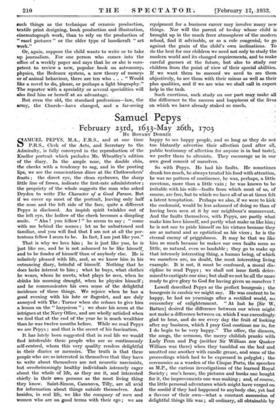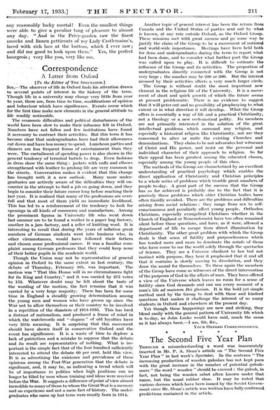Samuel Pepys
- February 23rd, 1633-May 26th, 17o3
BY BONAMY DOBREE
SAMUEL PEPYS, MA., F.R.S., and at one time P.R.S., Clerk of the Acts, and Secretary to the Admiralty, is fully conveyed in the reproduction of the Kneller portrait which preludes Mr. Wheatley's edition of the diary. In the ample nose, the double chin, the cheeks with a tendency to sag, and in the pouting lips, we see the conscientious diner at the Clothworkers' feasts ; the direct eye, the clean eyebrows, the sharp little line of frown, indicate the first-rate administrator ; the propriety of the whole suggests the man who asked Dryden to write The Character of a Good Parson. But if we cover up most of the portrait, leaving only half the nose and the left side of the face, quite a different Pepys is disclosed. An impish spirit twinkles out of the left eye, the hollow of the cheek becomes a dimpling smile. " Aha 1 you fellow 1" he seems to say ; "come with me behind the scenes ; let us be unbuttoned and familiar, and you will find that I am not at all the por- tentous fellow I seem to be. In fact, I am just like you."
That is why we love him ; he is just like you, he is just like me, and he is not ashamed to be like himself, and to be fonder of himself than of anybody else. He is infinitely pleased with life, and, as we know him in his entrancing diary, brimful of himself. Nothing that he does lacks interest to him ; what he buys, what clothe he wears, whom he meets, what plays he sees, when he drinks his morning draught, when he physics• himself ; and he communicates his own sense of the delightful incidence of these things. We rejoice when he has a good evening with his lute or flageolet, and are duly annoyed with The : Turner when she refuses to give him a lesson on the " harpsicon " ; we share his scorn at the intrigues at the Navy Office, and are wholly satisfied when we find that at the end of the year he is much wealthier than he was twelve months before. While we read Pepys we are Pepys ; and that is the secret of his fascination.
It has lately been suggested that in real life we would find intolerable these people who are so continuously self-centred, whom this very quality renders delightful in .their diaries or memoirs. The truth is that these people who are so interested in themselves that they have to write about themselves are not neurotic narcissists, but overbrimmingly healthy individuals intensely eager about the whole of life, as they see it, and interested chiefly in their own persons as the most living thing they know. Saint-Simon, Casanova, Tilly, are all avid for information about things outside themselves. And besides, in real life, we like the company of men and Women who are on good terms with their ego ; we are happy to sec happy people, and so long as they do not too blatantly advertise their affection (and after all, public testimony of affection for anyone is in bad taste), we prefer them to altruists. They encourage us in our own good conceit of ourselves.
So with Pepys. He had his faults, He sometimes drank too much, he always treated his food with attention, he was no pattern of continence, he was, perhaps, a little covetous, more than a little vain ; he was known to be irritable with his wife—faults from which most of us, of course, are free, but to which we have all of us at times felt a latent temptation. Perhaps we also, if we were to kick the coolunald, would be less ashamed of doing So than of having been seen at it by our neighbour's manservant. And the faults themselves, with Pepys, are partly what make him love himself, and partly what make us like him; he is not one to pride himself on his virtues because they are as natural and as egotistical as his vices ; he is the eternal enemy of priggishness. It may be that we like him so much because he makes our own faults seem so little, so natural, even so laudable ; they go -to make up that intensely interesting thing, a human being, of which we ourselves are, no doubt, the most interesting living example. It is not, it must be confessed, a Moral dis-_ cipline to- read Pepys ; ,s'e shall not issue forth deter- mined to castigate our sins; but shall we not be all the more ready to give glory to God for having given us ourselves ' Lowell described Pepys as the perfect bourgeois ; the bourgeois its excelsis WC might say. He was content-to he happy, he had no yearnings after a rectified world, no: coxcembry of enlightenment. ."At last he . [Sir W. Batteni desired the difference between our wives might not make a difference between us, which I was exceedingly. glad to hear, and do see every day the fruit of looking after my business, which I pray God continue me in, for I do begin to be very happy." The office, the dinners, the songs, the sermons, the merry childish pranks with Lady Penn and Peg (neither Sir William nor Quaker William was there) when they tumbled on the bed and smutted one another with candle grease, and some of the proceedings which had to be expressed in polyglot ; the ceremonies as a warden of the Cinque Ports, the speeches as M.P., the curious investigations of the learned Royal Society; one's house, the pictures and books one bought for it, the improvements one was making ; and, of course, the little personal adventures which might have verged on the sordid if they had happened to anybody else, yet had a flavour of their own—what a constant succession of delightful things life was ; all ordinary,-all obtainable by any reasonably lucky mortal! Even the smallest things were able to give. a peculiar tang of pleasure to almost any day. "And in the Privy-garden saw the finest smocks and linnen petticoats of my Lady Castlemaine's, laced with rich lace at the bottom, which I ever saw ; and did me good to look upon them." Yes, the perfect bourgeois ; very like you, very like me,







































 Previous page
Previous page